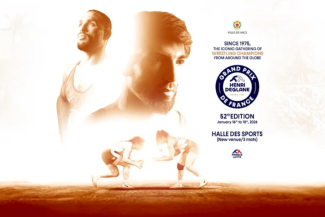Bonne, Bacsi and Gray Named Comeback Athletes of the Year
Saturday, December 22, 2018 - 16:43 By Eric Olanowski
CORSIER-SUR-VEVEY, Switzerland (December 22) -- United World Wrestling named Yowls BONNE-RODRIGUEZ (CUB), Peter BACSI (HUN), and Adeline GRAY (USA) the 2018 Comeback Athletes of the Year.
In freestyle, Cuba’s Yowls Bonne-Rodriguez won his first world title just days before his 35th birthday. Bonne finally obtained the elusive world gold medal after three previous attempts, scoring come-from-behind wins in the quarterfinals and finals.
In the quarterfinals, Bonne trailed Iran’s Mohammadbagher YAKHKESHI by two points with five seconds left when he hit a four-point inside trip and stole the match, 10-8.
Then, in the finals, Bonne trailed Russia’s Gadzhimurad RASHIDOV 2-0 before scoring a massive five-point move, which ultimately catapulted him to the top of the podium with a 5-5 criteria win.
This was Bonne's third world medal, previously finishing up the 2014 and 2017 World Championships with bronze medals.
Peter Bacsi, the 35-year-old Hungarian, won his first world championship since 2014 earning himself this year's Greco-Roman Comeback Athlete of the Year.
Basci trailed Turkey’s Emrah KUS 3-0 in the 82kg gold medal bout but scored four unanswered points to give the host nation their first and only gold medal of the Budapest World Championships.
The 2018 World Championships were rumored to be Bacsi’s last, but after his surprise victory he didn't rule out the 2019 Astana World Championships, though he did confirm he will not be making a run for Hungary’s 2020 Tokyo Olympic team.
Adeline Gray (USA) was named the women’s wrestling Comeback Athlete of the Year after returning from a year absence to win her fourth world title.
The American’s impressive road to her fourth world title went through reigning Olympic champion Erica WIEBE (CAN), and reigning world champion, Yasmin ADAR (TUR).
In the semifinals, Gray edged Wiebe, 3-1, and wrapped up the gold-medal bout early with a 13-1 win over Adar, winning the gold medal in a weight class that featured eight previous world champions.
The next award to be released will be the Outstanding Performances of the Year, which will come out on Thursday.


Share your thoughts.
Comments